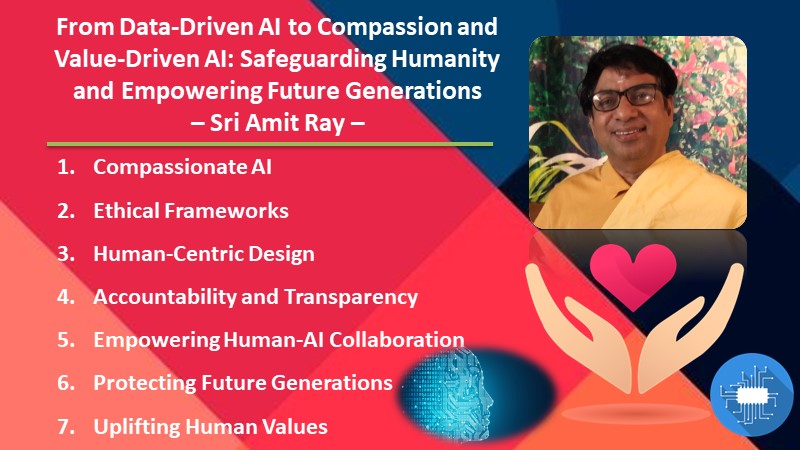In this article, we explore the transition from data-driven AI to compassionate AI and how it holds the key to safeguarding humanity and empowering the next generation. We can unlock the full potential of AI while assuring fairness, encouraging well-being, and creating meaningful human-machine interactions by incorporating empathy, ethics, and societal values into AI systems. By embracing compassionate AI, which incorporates empathy and societal values, we can overcome these limitations, safeguard humanity, and empower future generations.

Safeguarding Humanity and Empowering Future Generations
Recently, artificial intelligence (AI) has made enormous advances, revolutionizing sectors and reshaping the way we live and work. Data-driven AI has been at the forefront of this AI revolution, with its capacity to handle massive volumes of data and extract valuable insights.
However, as we continue to harness the power of AI, we must understand and confront the limitations of a data-only strategy. The transition to compassionate AI has arisen as a necessary and ethical necessity, with the goal of protecting mankind and empowering future generations.
We can unlock the full potential of AI while assuring fairness, encouraging well-being, and creating meaningful human-machine interactions by incorporating empathy, ethics, and societal values into AI systems. By embracing compassionate AI, which incorporates empathy and societal values, we can overcome these limitations, safeguard humanity, and empower future generations.
The Limitations of Data-Driven AI
“Data-driven AI lacks empathy, limiting its understanding of human emotions and needs.” – Sri Amit Ray
While data-driven AI has achieved remarkable feats by leveraging massive datasets and powerful algorithms, it faces inherent challenges. One major concern is the potential for bias. AI systems learn from historical data, and if that data is biased, it perpetuates and amplifies societal inequalities and discrimination. The limitations of data driven AI include:
- Bias Amplification: Data-driven AI systems can perpetuate and amplify biases present in the training data, leading to unfair and discriminatory outcomes.
- Lack of Contextual Understanding: Data-driven AI often lacks the ability to understand the broader context of a situation, limiting its decision-making capabilities to the information presented in the data.
- Lack of Emotional Intelligence: Data-driven AI lacks empathy and emotional intelligence, hindering its ability to understand and respond appropriately to human emotions and needs.
- Limited Adaptability: Data-driven AI models are typically trained on specific datasets and may struggle to adapt to new or unseen scenarios that differ from the training data, resulting in suboptimal performance.
- Ethical Dilemmas: Data-driven AI can face ethical dilemmas when confronted with situations where the available data or predefined rules do not provide clear guidance on the right course of action.
- Data Availability and Quality: Data-driven AI heavily relies on the availability and quality of data. In cases where data is limited, incomplete, or of poor quality, the performance and reliability of the AI system may be compromised.
Embracing Compassionate AI
“Compassionate AI understands and responds to human emotions, bridging the gap left by data-driven AI.” Sri Amit Ray
To address the limitations of data-driven AI, a shift towards compassionate AI is necessary. By incorporating ethical considerations and societal values into AI system design and deployment, we can mitigate biases and ensure AI serves the best interests of all individuals and communities. The five main areas for embracing compassionate AI:
- Enhancing Human-Machine Interaction: Embracing compassionate AI enables the development of AI systems that can understand and respond to human emotions and needs, fostering more meaningful and empathetic interactions between humans and machines.
- Addressing Bias and Promoting Fairness: Compassionate AI incorporates ethical considerations and societal values, mitigating biases present in data-driven AI systems. It promotes fairness, transparency, and accountability, ensuring that AI systems treat individuals and communities equitably.
- Improving Well-being and Emotional Support: Compassionate AI has the potential to provide emotional support and comfort in various domains such as healthcare and education. By understanding and responding to human emotions, AI systems can offer personalized and empathetic assistance, enhancing overall well-being.
- Personalized Experiences and Tailored Solutions: Compassionate AI can personalize experiences and provide tailored solutions to individuals based on their emotional states, preferences, and specific needs. This individualization enhances the effectiveness and impact of AI systems in areas such as education, mental health support, and customer service.
- Ethical and Responsible AI Development: Embracing compassionate AI necessitates ethical AI development practices. It involves collaboration among researchers, policymakers, and industry experts to establish guidelines and standards for designing, deploying, and governing AI systems. These practices prioritize the well-being of individuals and communities, ensuring AI serves as a force for good.
Overcoming Biases through Value-Driven AI
“Biases in data can perpetuate inequalities, highlighting the limitations of data-driven AI.” – Sri Amit Ray
Value-driven AI, unlike its data-driven counterpart, integrates ethics and societal values. By explicitly defining the values we want AI to adhere to, we can overcome biases present in the data. This approach promotes fairness, transparency, and accountability, ensuring AI systems serve as unbiased and trusted decision-making tools.
Fostering Connections with Compassionate AI
“Compassionate AI fosters meaningful connections between humans and machines, surpassing data-driven limitations.” – Sri Amit Ray
While data-driven AI excels at processing and analyzing information, it lacks the capacity for empathy and understanding. Compassionate AI fills this gap by designing systems that not only make intelligent decisions but also comprehend and respond to human emotions and needs. This human-like interaction enhances well-being and creates stronger bonds between humans and machines.
Transformative Impact of Compassionate AI
“While data-driven AI excels at analysis, compassionate AI excels at understanding and supporting human well-being.” – Sri Amit Ray
Compassionate AI can revolutionize various domains. In healthcare, AI systems exhibiting empathy can provide emotional support to patients when human interaction is limited. Virtual assistants equipped with compassion offer comfort and solace to those in distress. In education, compassionate AI personalizes learning experiences and provides emotional support to students, promoting academic and emotional growth.
Conclusion
Compassionate AI overcomes the limitations of data-driven AI, allowing us to harness the full potential of AI while safeguarding humanity and empowering future generations. By integrating ethics, empathy, and societal values, we mitigate biases, enhance well-being, and foster stronger human-machine interactions. The shift towards compassionate AI requires collaboration, education, and ethical governance to ensure that AI serves as a force for good, contributing to a sustainable and inclusive future for all.
References:
- Ray, Amit. “From Data-Driven AI to Compassionate AI: Safeguarding Humanity and Empowering Future Generations.” Compassionate AI, vol. 2, no. 6, 17 June 2023, pp. 51-53, Compassionate AI Lab, https://amitray.com/from-data-driven-ai-to-compassionate-ai-safeguarding-humanity-and-empowering-future-generations/.
- Ray, Amit. “Calling for a Compassionate AI Movement: Towards Compassionate Artificial Intelligence.” Compassionate AI, vol. 2, no. 6, 25 June 2023, pp. 75-77, Compassionate AI Lab, https://amitray.com/calling-for-a-compassionate-ai-movement/.
- Ray, Amit. “Ethical Responsibilities in Large Language AI Models: GPT-3, GPT-4, PaLM 2, LLaMA, Chinchilla, Gopher, and BLOOM.” Compassionate AI, vol. 3, no. 7, 7 July 2023, pp. 21-23, Compassionate AI Lab, https://amitray.com/ethical-responsibility-in-large-language-ai-models/.
- Ray, Amit. “Compassionate Artificial Intelligence Scopes and Challenges.” Compassionate AI, vol. 2, no. 4, 16 April 2018, pp. 48-50, Compassionate AI Lab, https://amitray.com/compassionate-artificial-intelligence-scopes-and-challenges/.
- Ray, Amit. Compassionate artificial intelligence: Frameworks and algorithms. Compassionate AI Lab, 2018.
- Ray, Amit. “Compassionate Superintelligence AI 5.0: AI with Blockchain, BMI, Drone, IoT, and Biometric Technologies.” Inner Light Publishers,2018.
- Ray, Amit. “Brain-Computer Interface and Compassionate Artificial Intelligence.” Compassionate AI, vol. 2, no. 5, 1 May 2018, pp. 3-5, Compassionate AI Lab, https://amitray.com/brain-computer-interface-compassionate-ai/.
- Ray, Amit. “The 10 Ethical AI Indexes for LLM Data Training and Responsible AI.” Compassionate AI, vol. 3, no. 8, 8 August 2023, pp. 35-39, Compassionate AI Lab, https://amitray.com/the-10-ethical-ai-indexes-for-responsible-ai/.
- Ray, Amit. “Compassionate Artificial Intelligence Scopes and Challenges.” Compassionate AI, vol. 2, no. 4, 16 April 2018, pp. 48-50, Compassionate AI Lab, https://amitray.com/compassionate-artificial-intelligence-scopes-and-challenges/.
- Ray, Amit. “The 7 Pillars of Compassionate AI Democracy.” Compassionate AI, vol. 3, no. 9, 28 September 2024, pp. 84-86, Compassionate AI Lab, https://amitray.com/the-7-pillars-of-compassionate-ai-democracy/.
- Ray, Amit. “Compassionate AI Democracy: Eliminating Legal Gaps Between the Poor and Wealthy.” Compassionate AI, vol. 3, no. 9, 28 September 2024, pp. 84-86, Compassionate AI Lab, https://amitray.com/compassionate-ai-democracy-eliminating-legal-gaps-between-the-poor-and-wealthy/.
- Ray, Amit. “Compassionate AI-Driven Democracy: Power and Challenges.” Compassionate AI, vol. 3, no. 9, 16 September 2024, pp. 48-50, Compassionate AI Lab, https://amitray.com/compassionate-ai-driven-democracy-power-and-challenges/.
- Ray, Amit. “Integrating LLM AI Models for Ayurveda Medical Diagnosis and Treatment.” Compassionate AI, vol. 4, no. 10, 23 October 2024, pp. 54-56, Compassionate AI Lab, https://amitray.com/llm-ai-models-for-ayurveda/.
- Ray, Amit. “7 Limitations of Deep Learning Algorithms of AI.” Compassionate AI, vol. 2, no. 4, 5 April 2018, pp. 15-17, Compassionate AI Lab, https://amitray.com/7-limitations-of-deep-learning-algorithms-of-ai/.
